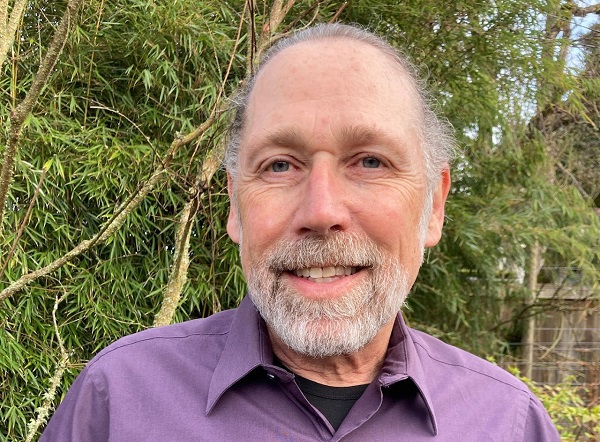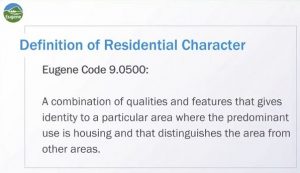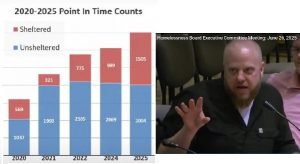Meet the candidate: Ted Coopman
6 min read
This is Meet the Candidate on KEPW News. Please tell us about yourself and why you’re running for city council.
Ted Coopman (City Council candidate, Ward 1): All right. My name’s Ted Coopman and I live in the Jefferson Westside neighborhood, in Ward 1 (of course). And I’m a retired college professor and I moved to Eugene full-time in 2016, and I’ve served on the Jefferson Westside Neighbors board since then, and have been reelected as chair every year since 2018.
[00:00:29] I also currently serve on the Eugene Chamber of Commerce’s Task Force on Homelessness. I’m running because I think Eugene is a great town with strong fundamentals and a lot of possibilities, but suffers from basically undeveloped political infrastructure. We have a political scene that is designed for a much smaller city.
[00:00:48] We need to put elected officials—not an appointed manager—in charge, so if voters are unhappy, they can make a change. Government should be responsible to everyone, not just certain groups.
[00:01:00] Eugene needs to, I think, really reassert its autonomy over the state. I’ve really, since I’ve been here, I’ve watched my neighbors struggle during COVID and under the impacts of homelessness and other misconceived city policies, and they really feel abandoned. So I want to make sure the city policies work for Ward 1, and that’s really what’s driving me as a candidate.
[00:01:23] John Q: What’s the most important issue facing Ward 1 this election? How would you address it?
[00:01:31] Ted Coopman (City Council candidate, Ward 1): The biggest issues are homelessness and public safety, which are, of course, related. We simply can’t have people living on the streets in unsafe and unsanitary conditions.
[00:01:41] It’s bad for them and for everyone else, as well as being incredibly expensive. That’s why I’ve advocated for sanctioned camping, managed camping since 2018.
[00:01:52] We also need more economic development to pay for things we need and to build out infrastructure for housing, primarily. We’ve got a lot of land within the urban growth boundary that can’t be used for housing because it doesn’t have services, it doesn’t have electricity, it doesn’t have water or sewer, and that’s really holding us back.
[00:02:12] The only way we’re going to deal with our housing issue is to build housing at scale. One-off, infill development is not going to be nearly enough and it’s very expensive. You need to basically build subdivisions in order to meet the need.
[00:02:25] Finally, we need to work better with the county. They are the ones that are actually responsible for housing, homelessness, health and human services. They have agencies like Homes for Good and Food for Lane County, as well as their Health and Human Services (Department), like we have our MAT (Medication Assisted Treatment) Clinic on West 11th.
[00:02:45] In the JWN, we have worked extensively with both Homes for Good and Food for Lane County. We’ve created 80 units of affordable housing and raised money to pay for thousands of meals.
[00:02:57] We just can’t afford to be duplicating services, especially services that are not our responsibility. And so I’m focusing on on delivering really basic services that I think are really ignored: trying to get our sidewalks fixed; street sweeping.
[00:03:10] Right now, neighborhoods that have a lot of multi-family homes that are low-income, their streets never get swept because there are always cars on the street. I mean, there are, right now, there are piles of leaves in my neighborhood and abandoned cars and things like that, that aren’t getting dealt with. And so setting up a system to where streets are cleared once a month takes care of abandoned cars, long-term camping, and makes it easier for cyclists and pedestrians.
[00:03:39] Trash collection: We’re the only city in Oregon that does not have franchises for trash collection. So right now, as most people know, you have trash trucks in your street every single day of the week. And that’s just crazy. And so, these are some basic things that I think we could do much better as a city.
[00:03:56] John Q: If elected, what would you do differently than the sitting councilor, Emily Semple, or your opponent, who at the time of this interview, is Eliza Kashinsky?
[00:04:09] Ted Coopman (City Council candidate, Ward 1): I worked a lot with Emily and worked hard to get her reelected. And she has really fought the good fight as far as trying to get things done, and it’s been a real uphill battle for her.
[00:04:19] As far as Eliza Kashinsky, really, the contrast could not be starker. As a long-term movement activist, I am more of a small-d democrat. I take a bottom-up approach to leadership and advocacy where everyone, not just interest groups, political parties, and financial interests have a meaningful say in public policy, including the details that make or break policies.
[00:04:44] The city needs to listen to everyone, not just hear those who reflect their own agenda. Neighborhood associations drive that sort of inclusive process. In contrast, Kashinsky is a big-D Democrat, so, very connected to the Democratic Party establishment. She’s all top-down. All you have to do is to look who’s endorsing her.
[00:05:05] She moved here from D.C. and started WECAN, her own group, to drive her vision of density and mass transit, and the first thing they did was undermine public process in the South Willamette refinement plan. The first time I ever met with her in 2016, she told me that ‘Neighbors are too self-interested to make the right choices on land use.’
[00:05:23] She’s been very vocal about wanting to dismantle our neighborhood associations, as they interfere with her and her cadre’s vision of land use. We are inconvenient. Her long service on the budget committee—note that our budget, huge budget shortfall, is also indicative of her insider status. You must have the inside track to get on the committee. I’ve tried and was rejected twice, as have many other troublesome folks.
[00:05:51] If you feel things are great in Eugene and want more of the same, then she’s someone you’re probably going to want to back. However, if you think city government is not serving the people and needs to be shaken up, then I’m asking for your support.
[00:06:03] John Q: Is there anything else you’d like to say to the voters? And how can people get involved in your campaign?
[00:06:12] Ted Coopman (City Council candidate, Ward 1): If you’re ready for a change and have city government work for you and with you, not against you and on you, then I would appreciate your vote.
[00:06:21] Eugene can do better and can be better. It could be a place we all want to live. Even if you’re not a Ward 1 voter, you can support change at the city level. We need five votes to make policy and need every vote to break the stranglehold of a political class that has run this town into the ground.
[00:06:35] So you can visit my website, www.tedcoopman.com (you need to add the W’s for some reason—it won’t find it otherwise) and you could make a donation. Every dollar counts, because ads and direct mail and yard signs all cost money. You could also endorse me, even if you’re not a Ward 1 voter. Or you could provide a statement of support, and all that’s on that website.
[00:07:04] We have a real problem in Eugene, is, that people have lost hope in the political process and so you get very, very low turnout. The voter turnout in the primaries has been very, very low. And what that means is that it allows small groups of people to make the decision that impacts everyone.
[00:07:22] And so, really, people need to make sure to get out. Actually, you don’t even have to go out. It’ll come to you. The ballot will come to you. You don’t even have to pay for a stamp. You don’t have to have stamps! You can just read the voter’s pamphlet, decide what you’re going to do, and then go ahead and vote.
[00:07:37] And the most important thing is that we need to signal to the state and to the city and to the people who have been basically calling the shots for years, is that voters are engaged—maybe a little enraged—and they want to have their voices heard. and they want government that really is going to work for them.
[00:07:56] John Q: Ward 1 candidate Ted Coopman. You can contact him through his website at www.TedCoopman.com.



